- Home
- John Bellairs
Eyes of the Killer Robot Page 7
Eyes of the Killer Robot Read online
Page 7
Fergie and Johnny looked at each other quickly.
"You can count me in, prof!" said Fergie, and he thumped his fist on the table.
"Me, too!" said Johnny loudly.
"Good for you!" said the professor, beaming. He patted the two boys on the shoulder. "I'll make up some reason why you two need another weekend vacation in the mountains, and with some luck we ought to be able to leave by tomorrow afternoon. In the meantime, we'd all better lock our doors and hope that that thing out there doesn't want to come back."
Johnny shuddered as he thought about Mrs. Tremblay. If the robot came to get them, what could they do to stop it? What could they possibly do?
CHAPTER NINE
On the following evening, Fergie, Johnny, and the professor were up in the mountains. It was dark and again it was pouring rain, and the three of them were standing around and staring at the maroon Pontiac, which was pulled off onto a muddy piece of ground near the road. The car had a flat tire that sagged like a collapsed pudding. With a jack handle clenched in his fist, the professor stood staring down at the tire in disbelief. He was wearing an old rubber rain poncho, and he was almost speechless with rage.
"I hate cars!" he snarled through clenched teeth. "If the people who run this country had any imagination, we'd be able to take buses anywhere at any time, so we could avoid ridiculous messes like this one!" He heaved a deep sigh and wiped rain off his face with his sleeve. "Oh, well!" he said wearily. "I guess I'd better stop crabbing and start jacking this miserable crate up."
"Do you know how to work a jack, professor?" asked Johnny timidly.
The professor turned and glared at him. "I most certainly do!" he said indignantly. "I changed the tire of an army truck while we were being shelled, during the battle of the Argonne Forest. Now stand back, please, and give me some room!"
With a lot of grumbling and cursing, the professor got busy. He had to work in the dark because he had forgotten to bring a flashlight. Carefully, he edged the jack in under the car. Then he stuck the handle into the socket and started pumping. Slowly the car rose... and then something bad happened. With a lurch, the car rolled forward and the jack fell over—the professor had forgotten to put the car in gear. Swearing violently, the old man hurled the jack handle out into the middle of the road. Then he stomped out to get it, but as he was walking back he stopped and stared at something. Holding his hand up to shield his glasses from the rain, the professor peered for a long time.
"John!" he called. "John! Byron! Do my eyes deceive me, or is there a light down the road there?"
Johnny and Fergie walked out to where the professor was. Sure enough, far down the road a blob of yellow light could be seen.
"How about that!" said the professor as he took off his glasses and dried them with his handkerchief. "I thought this road was deserted, so I never even bothered to... but see here! We're wasting time! Let's hike on down there and see if we can get some help. I'd love to have a hot cup of coffee and a chance to dry out, and I imagine you two feel the same way. Come on!"
The professor put his glasses back on, and the three of them tramped down the road through the falling rain. As they got closer, they began to make out the shadowy outline of a building. Fergie had the best eyes of the three, and he said that it looked like a gas station.
"Great!" said the professor, and he began to walk faster. "Wonderful! Maybe I'll be able to get some cigarettes— had to throw away my Balkan Sobranies because they got all soggy."
At last they arrived, and it did turn out to be a gas station after all. There were two Esso pumps, and a little one-story building with a slate roof. On the front of the building was an oblong window with a pink neon gas sign in it, and nailed up next to the door was a blue Ex-Lax thermometer. Kicking spurts of water into the air, the professor ran forward and jerked open the screen door. He pushed at the inside door, and a little bell tingled. The boys crowded in behind the professor, and now all three of them were standing in the little store. There was a small, glass-topped display case that held cigars and pipe tobacco and next to it, in a corner, was a scarred wooden chair with a cat curled up on its seat. Behind the counter were shelves full of canned food and a door that probably led to a back room, but the door stayed closed. Nobody came to answer the bell.
"Humph!" said the professor as he glanced discontentedly around. "Isn't that just the limit! The attendant leaves the light on and the door open, and just goes away. It's not the kind of evening for a long stroll in the woods, is it? Oh, well—he may have been called away by some emergency. Let's see if he turns up."
They waited. A small metal clock on a shelf ticked noisily, and rain rattled on the roof. The cat slept peacefully. Finally, just as the professor was getting ready to go outside and search, the door behind the counter opened. Out stepped a tall, gaunt old man who wore grease-stained overalls and a blue work shirt. He had a big mop of white hair, and there was a wart the size of a pea near the end of his nose. The skin of the old man's face was saggy, and his eyes were red-rimmed. He looked as if he had been sick for a long time, and he moved slowly. Oddly enough, his hands were long, pale, delicate, and soft-skinned—they didn't look like the hands of a man who spent his time fixing cars and pumping gas.
"I'm sorry to have kept you folks waiting," said the man as he pulled the door shut behind him. "I must have dozed off, so I didn't hear the bell. Is there anything I can help you with?"
Johnny's eyebrows rose. He had expected the man to use bad grammar the way his grampa did. But the man spoke clearly and precisely, with a faint trace of an English accent. It was strange.
The professor had also noticed the man's peculiar way of speaking, but his mind was on other things—he wanted to get his flat tire fixed so they could all be on their way. Harrumphing and coughing, he put on his best businesslike manner and told the old man what their problem was. The man stood dead still while the professor talked, but he didn't seem to be paying much attention to what he was saying.
"Hm... hm ..." he said at last, "you say you have a flat tire? Unfortunately, I can't do any heavy work—I hurt my back some time ago. But I have a young man who helps me sometimes. Let me see if I can locate him."
As the professor stood drumming his fingers impatiently on the counter, the old man pulled a telephone out of a cubbyhole in the wall and gave the operator a number. He muttered into the phone for a bit, and then hung up.
"He'll be coming very soon," the man announced. Then he smiled strangely and added, "He doesn't have very far to go to get here—I'm lucky I found him in. Would you all like some coffee while you're waiting?"
The three travelers all nodded eagerly, and the old man disappeared into the back room again. Humming tunelessly, the professor went to the window and watched the rain fall. Fergie took his jackknife out of his pocket, opened the small blade, and began cleaning his fingernails. Johnny started acting fidgety. He was getting more and more nervous by the minute, and he began to get the creepy idea that someone was staring at him. He could feel the stare—it was like heat coming from a radiator. And the stare seemed to be coming from the row of shelves behind the counter. But when Johnny looked, he saw nothing but cans and boxes. He told himself that he was having his "emergency" jitters—every time something went wrong, he started imagining all sorts of wild things. So he paced and tried to ignore his feelings.
After about a quarter of an hour had passed, the old man came back with a tray and three china mugs full of hot coffee. Sighing wearily, he began handing the mugs around—one for the professor, one for Fergie, and one for Johnny. The coffee tasted delicious. As they sipped, the old man went to the door and peered out into the rainy darkness.
"Here he comes!" he said suddenly. "Ah! Good! He'll be able to help you. He'll have that flat fixed for you in no time!"
The professor peered out the door, and he saw a shadowy figure standing just outside the light. He wondered why he hadn't heard a car motor, but then it occurred to him that there were houses in the
hills around this place. The young man had probably come down some mountain path, on foot. Oh, well, he was here—that was the important thing! Quickly the professor took another sip of coffee, but when he turned to Johnny, he stopped short. Johnny's face was deathly pale.
"I... I feel sick," he moaned. "I feel like I'm... coming down with somethin'. I'm sorry, I really am."
The professor sighed and patted Johnny on the shoulder. "John," he said, "you do not need to apologize for being ill. If you're sick, you're sick, as my dear mother used to say. Why don't you stay here and keep dry while we follow the mechanic back to the car? There's no reason for you to get soaked and catch pneumonia."
"The prof's right, John baby," Fergie added. "You stay here an' we'll be back in a jiffy. Okay?"
Johnny nodded. He was really miserable—he felt feverish and drowsy, and all the strength seemed to be draining out of his body. "All... all right," he muttered, rubbing his hand over his face. "I'll... see you guys... later."
Fergie and the professor went out, and the screen door slammed behind them. Johnny heard their footsteps as they splashed across the wet pavement. He couldn't understand why, but he felt vaguely frightened—he did not want to be left alone with the old man. I'm just imagining things, Johnny told himself. You get weird ideas when you have a fever. He turned and looked for someplace where he could sit down. But the cat was still sleeping in the chair, and the old man had not offered to find Johnny another seat. The clock ticked, and the rain pattered on. As Johnny watched blearily, the old man shuffled around the counter and started fussing with some cans that were on a shelf. With his back to Johnny, the man started to talk.
"Isn't it odd how you sometimes think someone is looking at you, when you're alone in a room?" he said suddenly.
Johnny's vision was blurring, and he was getting sleepier by the minute. But the words that the old man spoke struck terror into his heart. In a flash he was wide awake. As he watched in horror, the man stepped to one side, and Johnny saw something on the shelf that he hadn't seen before. It was a yellowish human skull with two glass eyes in the hollow sockets. The old man grinned wickedly, and the skull stared, and the room whirled around Johnny. Then everything went black, and he fell unconscious to the floor.
CHAPTER TEN
The wind began to blow, and the rain swept by in sheets. With their backs bent, and arms raised to ward off the wet, Fergie and the professor followed the silent young man down the road. They hadn't seen the man's face yet—he was just a shadow moving in front of them while the faint beam of his flashlight played over the glistening pavement. Finally they reached the car, and the professor started hunting around in the mud to see where he had left the jack handle. Suddenly Fergie spoke.
"Hey, prof! What happened to the guy with the flashlight?"
The professor straightened up, and he looked around. He couldn't see much, but the flashlight beam had disappeared.
"Hey!" yelled the professor. "Hey! Turn the blasted light on again, will you? Hello? Where are you?"
Silence. With a loud curse, the professor stumbled toward the car, opened the passenger-side door, and groped in the glove compartment. He pulled out his Nimrod pipe lighter and lit it. A Nimrod lighter is shaped like a tube and works in stormy weather, but it doesn't give much light. With the flaming tube in his hand, the professor walked all the way around the car. On the other side he met Fergie, who was standing dead still with his arms folded.
"What do you think happened to that creep?" asked Fergie angrily. "Where did he go?"
The professor was beginning to get alarmed: he thought about the old man's strange accent, and Johnny's sudden illness. Snapping the lighter shut, he reached out and grabbed Fergie's arm.
"Byron! Come on!" he said, excitedly. "We've got to get back to that gas station! Quick!"
Fergie and the professor ran back along the wet road as fast as they could. They were getting thoroughly soaked, and their shoes squished, but they didn't care—they were in a state of total panic. When they got to the gas station, they saw it was dark and deserted. The light over the gas pumps had been turned out, and rain dripped from the hand-painted cardboard sign that hung from the doorknob—the sign said CLOSED.
With a violent yell, the professor jerked open the screen door. He raised his foot and kicked at the inner door—once, twice, three times. The third kick did it, and the door swayed inward. Once again, the professor lit his lighter, and he looked around. The cat was gone, and the cans on the shelves behind the counter had been rearranged. Rushing forward, the professor kicked open the door behind the counter. There was nothing in the back room but darkness and a musty, shut-up smell. With a long, shuddering sigh, the professor snapped his lighter shut. He stumbled back out to the front room of the gas station and pounded his fists on the counter.
"Oh, what a fool I was!" he exclaimed. "What an unbelievable addlepated fool! I should have realized that something was wrong, and I should never have left John here alone! This mess is all my fault! If I hadn't dreamed up that wild, harebrained plan to find Sloane's robot and strike out Cliff Bullard, John would be home in his bed, safe and sound! This is terrible! What on earth are we going to do?"
As Fergie watched, the professor broke down. He put his face in his hands and sobbed. Finally, when he was all cried out, he pulled out his soggy handkerchief and blew his nose loudly. But as he was stuffing his handkerchief into his pocket, he let out a loud exclamation.
Fergie jumped. "Hey! Hey, what is it, prof? Did yon remember somethin'?"
The professor gritted his teeth. "Yes, I remembered something!" he growled. "A long time ago, Henry Dixon told me that Evaristus Sloane had a large wart near the end of his nose. Byron, that old man was Evaristus Sloane!"
Fergie's jaw dropped. "Huh? I thought you said he was dead."
The professor bit his lip. "That was another mistake that I made. Sloane was about thirty years old when he made the robot that we found, and that was fifty-three years ago, so he's in his eighties now. Charley Coote and I had figured he was dead, but we figured wrong. Oh, what fools we were! No wonder poor Charley couldn't find out where he was buried! Sloane is alive! And he's still practicing the black arts. That 'young man' was just a spectre that he raised up to lead us away from here while he kidnaped John! I can't imagine why he wanted to take him, but if we don't find the two of them in a hurry... well, I don't like to think about what might happen."
Fergie clenched his fists. "If I catch that old creep, I'll tie his magic wand in a knot and stick it in his ear!" he said hatefully.
"Atta boy!" said the professor, patting Fergie on the arm. "We'll fix the rotten swine! First, however, we've got to find him, and that may be rather difficult. Where do you think we ought to look? Have you got any bright ideas?"
Fergie rubbed his chin. "I think we oughta go up to the house in the mountains, just like we were gonna do before we had our flat tire. Maybe they won't be there, but it's as good a place as any to try."
The professor nodded. "I think you're right—it's the only thing we can do. But before we do anything, we are going to have to go back and change that rotten flat tire. I feel tired, but I think I can do it with your help. How does it look outside?"
Fergie opened the door and poked his head out. The rain was letting up, and overhead he could see a ghostly moon behind racing clouds.
"I think the rain's gonna stop, prof," he said. "It won't be so bad out there now—just kinda muddy. I bet we can get the tire changed."
The professor heaved a deep sigh and wiped rain off his poncho with his hand. "It'll have to be done, I suppose," he said wearily. "If I had stuck with the job and finished it, we wouldn't be in this mess—but there's no use crying over spilled milk. Come on, my stouthearted friend. Off we go!"
While Fergie and the professor struggled to change the tire, Johnny lay on the back seat of a car that bounced and jounced over a rugged mountain road. He kept waking up and blacking out, over and over again, and whenever he tried t
o move his arms and legs, he found that he couldn't. Finally the car jolted to a stop. Johnny heard a car door slam, and then the door near his head opened, and he was roughly dragged out onto the ground. Standing over him was the tall, stooped old man, the gas station owner.
"So nice to meet you!" said the man as he grabbed Johnny by the collar and started dragging him across the wet grass. "You're Henry Dixon's grandson, aren't you? I thought I would have to go down to Duston Heights to get you, but you came up here to me! How very convenient! You know, your grandfather did me wrong many years ago, and now Fm going to get even. And you're going to help me. Don't you feel honored? Of course you do! I knew you'd be pleased! Wait till you see what I've made. It's almost done, but it needs a few finishing touches, if you know what I mean. Years ago, I made a mechanical man that worked because its eyes were really the eyes of a living human being—a human who had been living at one time, that is. I used an ancient magic formula to do this, and I added a little extra twist of my own. For a long time I had been fascinated by the legend that says that a dead man's eyes reflect the last thing he ever saw on earth. But what if the last thing he sees is himself? When I killed that poor man to make my robot, I held a mirror up to his face, and then, later, when I put his eyes in the robot, it took on the shape of a real human being! That is, it took on the shape of the man I had killed. Imagine how pleased I felt when I knew that I had improved on the old formula!" The old man paused and sighed. "Unfortunately," he went on, "the robot didn't work out, but you are going to help me remedy that. You are going to contribute to a great scientific experiment. Doesn't that make you feel proud?"

 The Curse of the Blue Figurine
The Curse of the Blue Figurine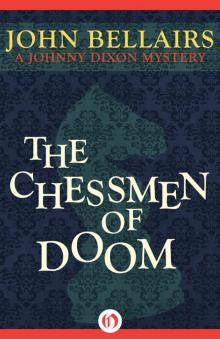 Chessmen of Doom
Chessmen of Doom Secret of the Underground Room
Secret of the Underground Room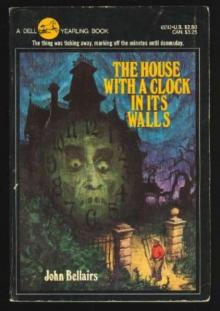 The House With a Clock in Its Walls
The House With a Clock in Its Walls The Vengeance of the Witch-Finder
The Vengeance of the Witch-Finder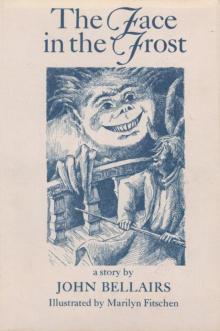 The Face in the Frost
The Face in the Frost Revenge of the Wizard's Ghost
Revenge of the Wizard's Ghost Spell of the Sorcerer's Skull
Spell of the Sorcerer's Skull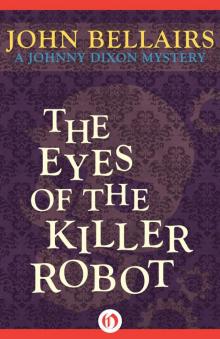 Eyes of the Killer Robot
Eyes of the Killer Robot Mummy, the Will, and the Crypt
Mummy, the Will, and the Crypt Wrath of the Grinning Ghost
Wrath of the Grinning Ghost The Mansion in the Mist
The Mansion in the Mist The Doom of the Haunted Opera
The Doom of the Haunted Opera The Bell, the Book, and the Spellbinder
The Bell, the Book, and the Spellbinder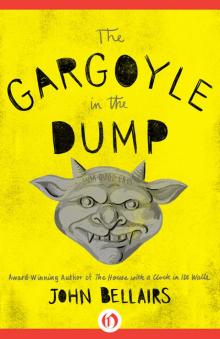 The Gargoyle in the Dump
The Gargoyle in the Dump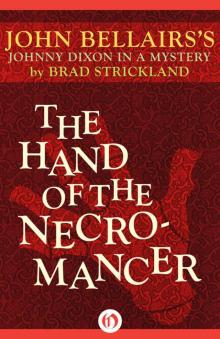 The Hand of the Necromancer
The Hand of the Necromancer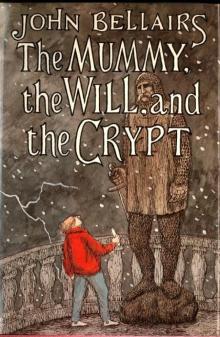 The Mummy, the Will, and the Crypt
The Mummy, the Will, and the Crypt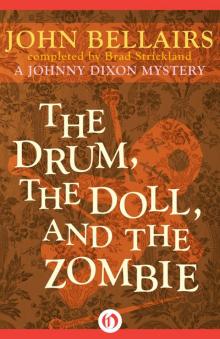 Drum, the Doll, and the Zombie
Drum, the Doll, and the Zombie The Specter from the Magician's Museum
The Specter from the Magician's Museum The Letter, the Witch, and the Ring
The Letter, the Witch, and the Ring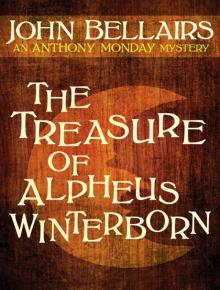 The Treasure of Alpheus Winterborn
The Treasure of Alpheus Winterborn The Dark Secret of Weatherend
The Dark Secret of Weatherend The Figure in the Shadows
The Figure in the Shadows